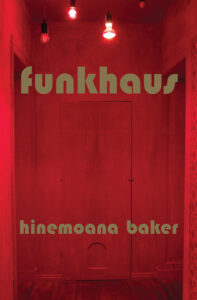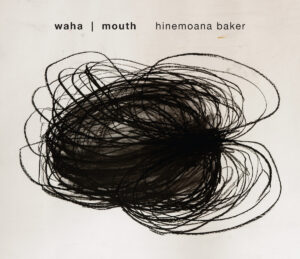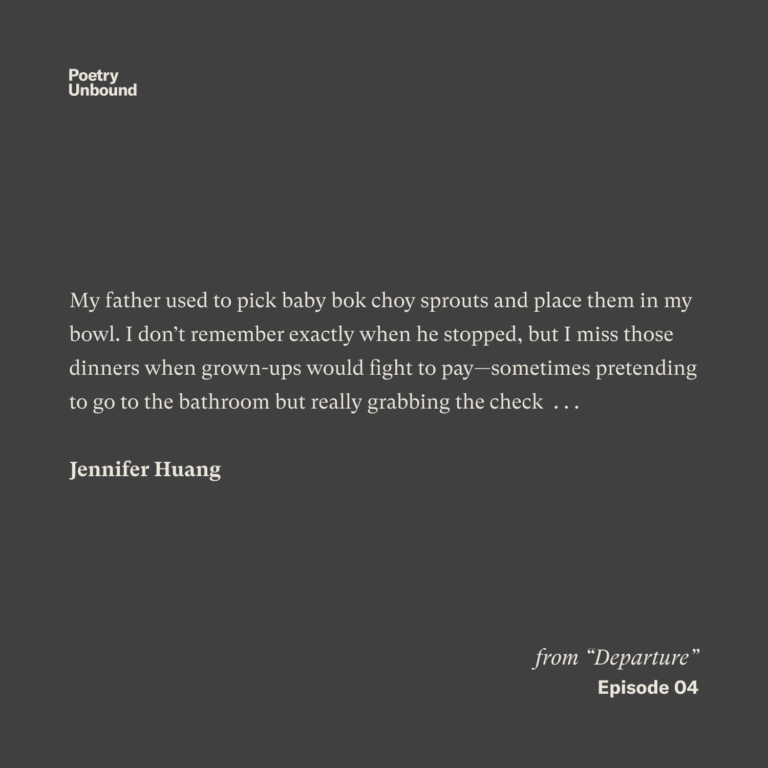Hinemoana Baker
if i had to sing
In the aftermath of disaster, how do you sing a song to mark what’s gone, and praise what’s growing?
We’re pleased to offer Hinemoana Baker’s poem, and invite you to connect with Poetry Unbound throughout this season.
Pre-order the forthcoming book Poetry Unbound: 50 Poems to Open Your World and join us in our new conversational space on Substack.
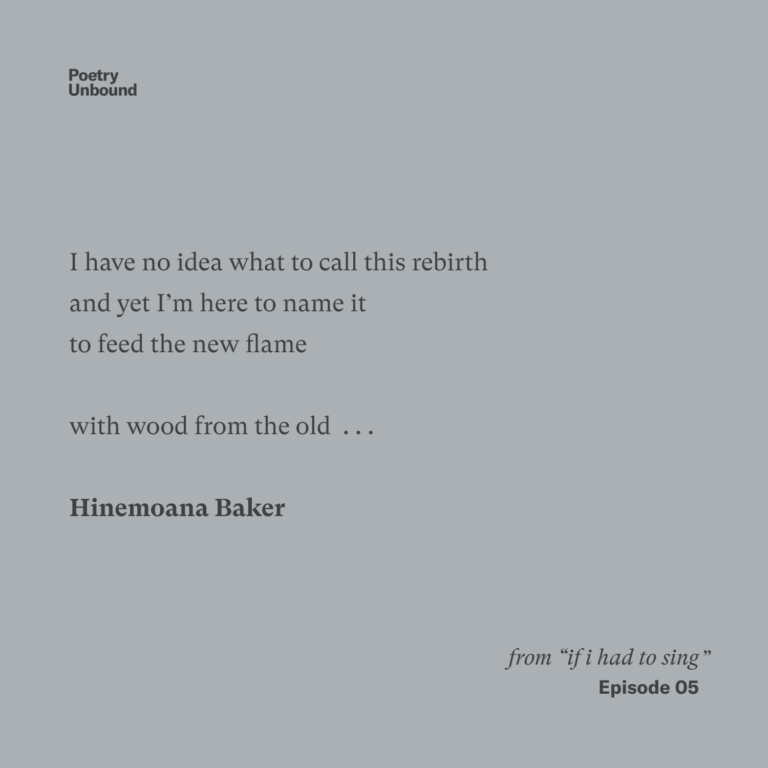
Guest
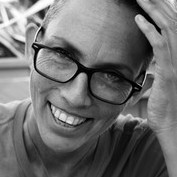
Hinemoana Baker is a writer and musician living in Berlin, Germany. Baker descends from the Ngāi Tahu tribe in the South Island of New Zealand and from Ngāti Raukawa, Ngāti Toa, and Te Āti Awa in the North Island. Baker is the author of several books of poetry including mātuhi | needle (Victoria University Press and Percival Press 2004), kōiwi kōiwi | bone bone (Victoria University Press 2010), and funkhaus (Victoria University Press 2020). She is currently completing a PhD at the University of Potsdam with the research training group RTG Minor Cosmopolitanisms.
Transcript
Pádraig Ó Tuama: Friends, thanks very much for listening to Poetry Unbound, whether you’re new or you’ve listened to them all — your attention makes everything worthwhile. And I’ve got some news: I’ve written a book, Poetry Unbound: 50 Poems to Open Your World. There’s 50 poems, each with a fresh essay written by me. I’d love if you’d pre-order it, or pre-order a few, and join up to our free interactive newsletter. Links to everything at poetryunbound.org.
[music: “Praise the Rain” by Gautam Srikishan]
My name is Pádraig Ó Tuama, and one of the things I love about poetry is that in public events, particularly public events that are marking a time of difficulty, if the right poem is chosen and recited in a particular way, it can act like some kind of a civic ritual.
I’ve been at commemoration events after tragedies, and events like this have a certain sobriety to them where you’re praising what’s still surviving as well as lamenting what’s gone. And poetry can do that by what’s said, and by what’s unsaid.
[music: “Praise the Rain” by Gautam Srikishan]
“if i had to sing” by Hinemoana Baker
“I have no idea what to call this rebirth
and yet I’m here to name it
to feed the new flame
“with wood from the old.
Language is a flute, a lily,
a chair overbalancing,
“a church we teeter
on the threshold of.
There are places where
“they harvest water from the air–
drink fog from a glass then overnight
hang the rag back on the bayonet.
“Does a thing which is reborn
need to have died?
All those cities still live
“in my mirrors, they rise
and fall again with the sun’s
rounds, the way the planet
“carves its own seismic
trench in the solar system.
The spring charges
“and recharges its river system
while on the columns of our lives
press unimaginable stresses.
“Hold me up now, as I do you.
Sing, and steady me under
your strong, sure feet.”
[music: “Every Place We’ve Been” by Gautam Srikishan]
So this poem by Hinemoana Baker was commissioned for the reopening of the art gallery in Christchurch on the South Island of Aotearoa, New Zealand. The art gallery had sustained some damage during the February, 2011 earthquake in Christchurch, and it was about four years later before it reopened again. And this poem was recited, commissioned for that opening and recited there.
And so I’ve spent a lot of time thinking about this line:
“Language is a flute, a lily,
a chair overbalancing,
“a church we teeter
on the threshold of.”
First of all, it’s such a lovely thing to say this line: “…we teeter / on the threshold of.” How gorgeous. And what can it mean? You know, a flute, a lily, a chair, a church. And a flute is something that has air passing through it. And a lily, something delicate. And “a chair overbalancing.” So much of this calls to mind some of the aspects of an earthquake. You know, there’s noise and things shaking, and things losing their balance. Strange winds gusting through places you weren’t expecting, and things teetering. And perhaps a threshold is a place you might have been told to go and shelter under. A place of in between-ness.
Suddenly time changes enormously when you’re in an earthquake, because you’re thinking: ‘Is it over? Is it passing? Is it coming back? When are there going to be aftershocks?’ In light of a city almost being destroyed, how do we make ourselves again? And Hinemoana Baker is suggesting with music and flowers, and thresholds to cross through, through an invitation. And language too, must be an invitation back into delight, to find a way where you can begin to use language that isn’t just the language of urgency and the language of disaster. But that language, in light of saying things like Richter scales and seismic shocks, language also can be used to describe what is essential to us in terms of the soul. Something beautiful, somewhere to rest, an invitation, something to admire, a lily.
[music: “Daybreak” by Gautam Srikishan]
The poem finishes almost like a prayer.
“Hold me up now, as I do you.
Sing, and steady me under
your strong, sure feet.”
And who’s the you? “Hold me up now, as I do you.” Sometimes I think it’s the art gallery. And I began to wonder, as I was reading this poem and reflecting on it, on what does a gallery represent? You know, a gallery is a place where we, as human beings, display what it is that we create. It’s a place of reciprocality, and a place where people come to encounter the strange and to encounter the known and the unknown, the parts of ourselves that we acknowledge, the parts of ourselves that are hidden, and where we can receive steadiness from it. And I think that is one of the things that this poem is doing. It’s a poem to a particular gallery, but even more so it’s a poem in praise of the necessity that is art.
Why, after an earthquake, would you want to restore an art gallery? Of course, hospitals and other places of prime urgency get first call. But why art galleries? Why are they so necessary? And I think Hinemoana Baker has touched on this so powerfully here:
“Hold me up now, as I do you.
Sing, and steady me under
your strong, sure feet.”
To be given the possibility of standing again, to be given the possibility of feeling like you’re being held up by the earth, especially in a place where there’s been an earthquake. How can you begin to trust the ground under your feet? This is a strong hymn of praise to the solidity of place in a gallery, to say: literally hold me up. But also, as I’m there, let me see something of humanity reflected back to me in that which is displayed in the gallery. Art is essential because it reminds us who we are as we make it. Each makes the other in an exchange of glance.
[music: “Creatures of Myth” by Gautam Srikishan]
The name of the art gallery in Māori is Te Puna o Waiwhetū. And one of the words in that title refers to underground water, an artesian spring. An artesian spring is one where pressure is exerted on underground water, causing the water to seek the surface. And so you hear in this poem “…while on the columns of our lives / press unimaginable stresses.” That perhaps can refer to the way within which there are unimaginable stresses being pressed on the underground water systems, as well as on the lives of people who are living in the aftershock and the after effect of devastating earthquakes.
I’ve troubled over the lines in this poem:
“There are places where
they harvest water from the air–
drink fog from a glass then overnight
hang the rag back on the bayonet.”
I’ve wondered what’s being referred to. I love the casual dropping in here of questions to do with, where do you get water when perhaps your water supply is gone? There’s places where you harvest water from the air, drinking fog from a glass. There isn’t the idea of this is all pretty and easy, ‘cuz overnight, “hang the rag back on the bayonet.” Something sharp, a weapon. And here we see the edge of survival. Here we see old technologies that we’ve needed for a long time. Technologies that hurt us, technologies that bring us to the sense of defending ourself. Not by fighting each other, but by fighting for survival in the very earth that can sometimes seem so fractured.
There’s a certain caution in the title. “if i had to sing.” This is a poem that considers: ‘If I had to sing, well then here’s what I’d sing.’ And so it makes you wonder, is the poet experiencing some ambivalence about singing something to a gallery? They’re singing in the aftermath of grief; so many people died in this earthquake in 2011. And the “If I had to sing” perhaps is a tentative caution about ‘how do I feel about singing in light of the fact that four years before so many people’s lives were lost as well as unalterably changed?’
[music: “Catching Water” by Gautam Srikishan]
There’s an invitation into a strange suspension of time in this poem. The cities of the past that are still in the present “…rise and fall again with the sun’s / rounds…” And then there’s reference to the solar system, “…the way the planet // carves its own seismic / trench in the solar system.” Hinemoana Baker is linking the earthquake to the larger shock of continually realizing that we’re on a planet that makes its own way through time and space and gravity in the way that it does.
Of course, things are constantly changing. Of course, things are alive and dead at the same time. Of course, the ground beneath us is not always steady because look at what we know about our small planet in the vastness of the known universe. The experience of living through an earthquake teaches you something about the essence of being alive. For us as human beings, art and language are of the quality of deep essence because they remind us of the smallness of our own time and yet the great magnitude of the imagination that we’re hoping to make use of for mutual living.
[music: “Into the Earth” by Gautam Srikishan]
“if i had to sing” by Hinemoana Baker
“I have no idea what to call this rebirth
and yet I’m here to name it
to feed the new flame
“with wood from the old.
Language is a flute, a lily,
a chair overbalancing,
“a church we teeter
on the threshold of.
There are places where
“they harvest water from the air–
drink fog from a glass then overnight
hang the rag back on the bayonet.
“Does a thing which is reborn
need to have died?
All those cities still live
“in my mirrors, they rise
and fall again with the sun’s
rounds, the way the planet
“carves its own seismic
trench in the solar system.
The spring charges
“and recharges its river system
while on the columns of our lives
press unimaginable stresses.
“Hold me up now, as I do you.
Sing, and steady me under
your strong, sure feet.”
[music: “Praise the Rain” by Gautam Srikishan]
Chris Heagle: “if i had to sing” comes from Hinemoana Baker’s book Funkhaus. Thank you to Te Herenga Waka University Press and Hinemoana, who gave us permission to use her poem. Read it on our website at onbeing.org.
[music: “Praise the Rain” by Gautam Srikishan]
Poetry Unbound is: Gautam Srikishan, Eddie Gonzalez, Lilian Vo, Lucas Johnson, Amy Chatelaine, Kayla Edwards, and me, Chris Heagle.
Our music is composed and provided by Gautam Srikishan and Blue Dot Sessions.
This podcast is produced by On Being Studios, which is located on Dakota land. Open your world to poetry with us by subscribing to our Substack newsletter at poetryunbound.org. You may also enjoy our other podcast On Being with Krista Tippett, or our newsletter, The Pause. Visit us at onbeing.org to find out more.
Books & Music
Recommended Reading
The On Being Project is an affiliate partner of Bookshop.org and Amazon.com. Any earnings we receive through these affiliate partnerships go into directly supporting The On Being Project.





